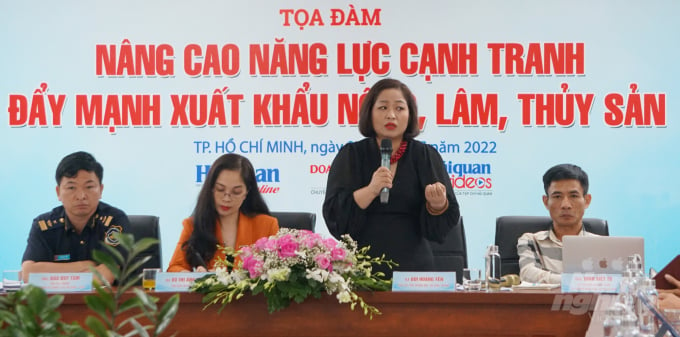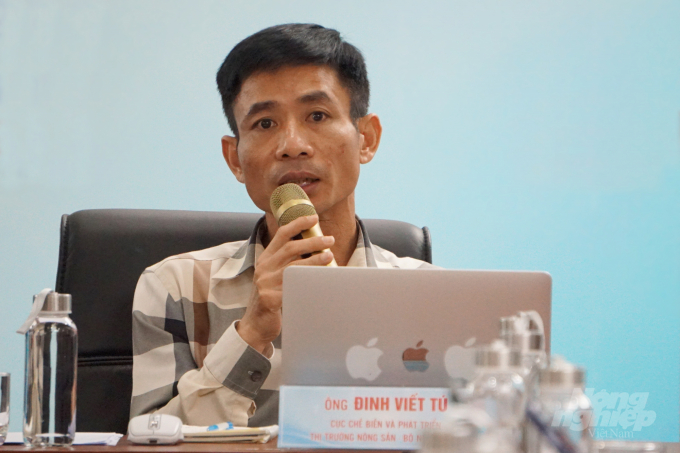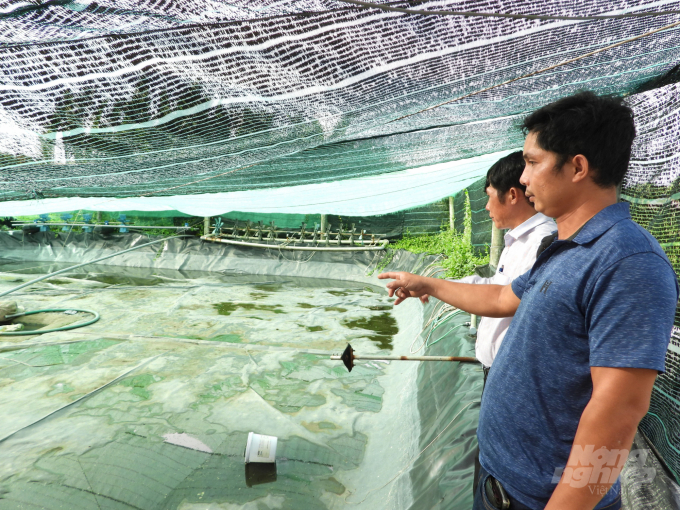November 28, 2025 | 01:03 GMT +7
November 28, 2025 | 01:03 GMT +7
Hotline: 0913.378.918
November 28, 2025 | 01:03 GMT +7
Hotline: 0913.378.918

Workshop on "Improving competitiveness, promoting export of agricultural, forestry and fishery products". Photo: Nguyen Thuy.
At the Workshop on "Improving competitiveness, promoting export of agricultural, forestry and fishery products" held on July 26 in Ho Chi Minh City, Mr. Dinh Viet Tu, Deputy Director of the Sub-Department of Agricultural Product Processing and Development Region I (Ministry of Agriculture and Rural Development) said that: despite the heavy impacts of the Covid-19 pandemic as well as political conflicts on a global scale, Vietnam's export of agricultural, forestry and fishery products within the first six months of 2022 reached nearly 28 billion USD. This is an increase of nearly 14% compared to the same period in 2021.
According to Mr. Tu, this is a positive signal, affirming the position of Vietnamese agriculture, forestry and fisheries in the international arena. This is especially true after Vietnam has signed 15 new-generation free trade agreements with the majority of the developed economic regions. This is an opportunity for Vietnam to expand and develop the market, affirming its position, potentials and strengths in the agricultural, forestry and fishery sector.
According to the General Department of Customs, Vietnamese agricultural, forestry and fishery products are present in over 180 countries and territories around the world, many of which reach over 1 billion USD in export turnover, such as coffee, rice, vegetables, shrimp, pangasius, etc.

Mr. Dinh Viet Tu, Deputy Director of the Sub-Department of Agricultural Product Processing and Development Region I, Ministry of Agriculture and Rural Development. Photo: Nguyen Thuy.
Ms. Bui Hoang Yen, Deputy Head of the Southern Working Group under the Department of Trade Promotion, Ministry of Industry and Trade, said that businesses pay special attention to solutions that utilize the advantages brought by the EVFTA. It is necessary to actively seek information to fully grasp EU commitments as well as information on tariff preferences.
According to Ms. Yen, businesses must determine the production scale for each product line, apply mechanization into production as well as ensure uniform quality. They must transform product structure along the value chain, from exporting raw materials to processed products.
This also includes tranformation from simple processed products to deep processed products, from low value added products to high value added products. In addition, investment in innovation and improvement of the quality of machinery, equipment, production technology, production processes, corporate governance methods, and quality of human resources will be effectively promoted.
On the other hand, businesses will strengthen linkages in production - transportation - processing - consumption between raw material suppliers and final product production, between farmers - the state - scientists - entrepreneurs; between domestic enterprises and FDI sources; Apply standards suitable for export markets including technical standards, food safety and environment.
Mr. Dinh Viet Tu added that, several products are prioritized for the implementation of geographical indications and qualified for the planting area code, packaging facility code in accordance with the standards of the importer. Thereby strengthening the advantages, seizing the initiative in the source of raw materials, increasing the added value of the exported products. Subsequently, businesses need to properly invest in processing facilities and warehouses to preserve agricultural and aquatic products.
"Vietnam currently has over 7,500 businesses with deep processing facilities. However, the volume of agricultural, forestry and fishery products in Vietnam is substantial and the processing facilities' capacity has not met the demand, leading to the stagnation in the flow of Vietnam's goods, especially during the peak season, and the processing machineries are often overloaded", said Mr. Tu.

Organizing shrimp farming areas according to the value chain links. Photo: Nguyen Thuy.
Mr. Tu recommended that businesses should focus on establishing and developing brands to avoid commercial fraud. They need to focus on producing high quality products, because this is the core issue.
Regarding state management agencies, it is necessary to focus on developing policies to support and encourage synchronous mechanization in the production and processing of agricultural, forestry and fishery products.
As for local governments, training for high-quality human resources in the management and operation of production is a necessity. Moreover, localities need to develop logictis to resolve difficulties and challenges in transportation. In addition to domestic support, units should advise the province to build appropriate mechanisms and policies to attract investments from foreign businesses and expand production areas.
Vietnam has successfully entered into 15 free trade agreements, so in order to compete in terms of quality with countries exporting products similar to Vietnam's, it is necessary to improve the value and competitiveness of our national products.
Translated by Nguyen Hai Long

(VAN) After the institutional merger, Da Nang possesses significant forest-carbon reserves and is proactively engaging in the carbon market, creating a new revenue stream.

(VAN) An Giang strengthens communication against IUU fishing, increases inspections and sanctions, and is determined to remove the EC’s “yellow card” while developing a sustainable fisheries sector.

(VAN) As green transition becomes a global trajectory, Viet Nam’s biggest challenge is not only technology and models, but how to ensure that capital flows reach the right beneficiaries.

(VAN) The Ministry of Agriculture and Environment must spearhead the construction of green governance, spanning decision-making processes and investment standards to policy evaluation mechanisms.

(VAN) The Agriculture and Environment sector of Khanh Hoa has achieved numerous milestones over the past 80 years, contributing significantly to the goal of establishing the province as a centrally governed city by 2030.

(VAN) Viet Nam is entering the pivotal period of 2025-2030, moving toward the formulation of the Remote Sensing Law, which will establish a legal foundation for the development of national digital data.

(VAN) The agricultural sector is finalizing the strategic framework for emission reduction, setting the goal of sharply cutting methane and 403.7 million tons of CO2 equivalent and moving toward Net Zero by 2050.